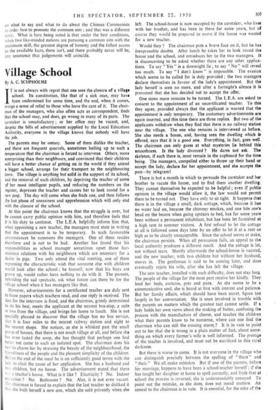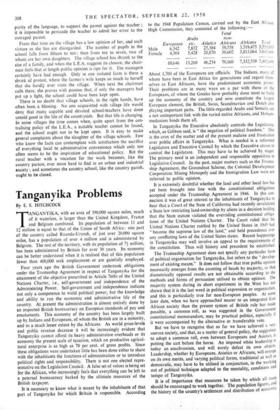Village School
ByA. C. SCUPHOLME
IT is not always with regret that one sees the closure of a village school. Its constitution, like that of a sick man, may have been undermined for some time, and the end, when it comes, brings a sense of relief to those who have the care of it. The chair- man of the managers, who also often acts as correspondent, finds that the school may, and does, go wrong in many of its parts. The caretaker is unsatisfactory ; or her office may be vacant, and, despite the bills of advertisement supplied by the Local Education Authority, everyone in the village knows that nobody will have the job.
The parents may be uneasy. Some of them dislike the teacher, end there are frequent quarrels, sometimes boiling up to such a temperature that the chairman is forced to intervene. Others, more enterprising than their neighbours, and convinced that their children will have a better chance of getting on in the world if they attend a bigger school, arrange for their transport to the neighbouring town. The village is anything but solid in the support of its school, and the removal of such children, by depriving the teacher of some of her most intelligent pupils, and reducing the numbers on the register, depresses the teacher and causes her to look round for a new polt. The day will come when she finds one, and then follows the last phase of uneasiness and apprehension which will only end with the closure of the school.
At this point the chairman knows that the struggle is over, but he cannot carry public opinion with him, and therefore feels that it is his duty to continue. The L.E.A. helpfully inform him that, when appointing a new teacher, the managers must state in writing that the appointment is to be temporary. In such favourable circumstances he summons the managers. One of them resides elsewhere and is not to be had. Another has found that his responsibilities as school manager sometimes upset those har- monious relations with his neighbours which are necessary for a dealer in pigs. Two only attend the vital meeting, one of them expressing the characteristic wish that someone else with children would look after the school ; he himself, now that his boys are grown up, would rather have nothing to do with it. The parents, beholding the sad spectacle, ask what future can there be for the village school when it has managers like that.
However, advertisements for a certificated teacher are duly sent to those papers which teachers read, and one reply is received. The date for the interview is fixed, and the chairman, grimly determined to do his best, meets the applicant at the nearest bus-stop, a mile or two from the village, and brings her home to lunch. She is not specially pleased to discover that the village has no bus service, that it is four miles to the nearest railway station and eight to the nearest shops. She notices, as she is whisked past the small group of houses, that there is not much village at all, and before she has even tasted the soup, she has thought that perhaps one had better not come to such an isolated spot. The chairman does his best to charm her by stressing the beauty of the neighbourhood, the friendliness of the people and the pleasant simplicity of the children. Before the end of the meal he is on sufficiently good terms with the lady to elicit the cause of her application. She has a husband and two children, but no house. The advertisement stated that there v,'i a teacher's house. What is it like ? Electricity ? No. Indoor sanitation ? No. Bathroom ? No. Alas, it is not even vacant. The chairman is forced to explain that the last teacher so disliked it that she built herself a new one, which she sold privately when she
left. The school-house is now occupied by the caretaker, who lives with her brother, and has been in there for some years, but of course they would be prepared to move if the house was wanted for a new teacher.
Would they ? The chairman puts a brave face on it, but he has Inexpressible doubts. After lunch he takes her to look round the
house and the school, and introduces her to the two managers. It is disconcerting to be asked whether there are any other applica- tions. To say " Yes " is a downright lie ; to say " No " will reveal too much. To say " I don't know " is impossible. The evasion
which seems to be called for is duly provided ; the two managers declare themselves in favour of the lady's appointment. But the lady herself is seen no more, and after a fortnight's silence it Is presumed that she has decided not to accept the offer.
One stone more remains to be turned. The L.E.A. are asked to consent to the appointment of an uncertificated teacher. To this they agree, provided always that the applicant is warned that the appointment is only temporary. The customary advertisements are again inserted, and this time there are three replies. But two of the applicants withdraw when they find that there is no railway station near the village. The one who remains is interviewed as before. She also needs a house, and, having seen the dwelling which is offered, says that it is a good one. Everything, in fact, goes well.
The chairman can only guess at what mysteries lie behind this smoothness. Is the lady divorced ? He dares not ask. The skeleton, if such there is, must remain in the cupboard for the time being. The managers, compelled either to throw up their hand or accept the lady, declare for her appointment, and she accepts the post—by telegram!
There is but a month in which to persuade the caretaker and her brother to vacate the house, and to find them another dwelling.
They cannot themselves be expected to be helpful ; even if publics opinion in the village would allow it, the law would not permit them to be turned out. They have only to sit tight. It happens that there is in the village a small, dark cottage, which, because it has no water laid on, because the chimney smokes, and one hits one's head on the beams when going upstairs to bed, has for some years been without a permanent inhabitant, but has been let furnished at a high rent to summer visitors. A first refusal to let the cottage at all is followed some days later by an offer to let it at a rent so high as to be clearly unacceptable. Since the school seems at stake, the chairman persists. When all persuasion fails, an appeal to the local authority produces a different result. And the cottage is let,
not without tears. Shortly afterwards the school-house is vacated, and the new teacher, with two children but without her husband, moves in. The gentleman is said to be coming later, and does eventually rejoin his wife, after she has left the village.
The new teacher, installed with such difficulty, does not stay long. The people of the village for the most part receive her kindly. They lend her beds, curtains, pots and pans. As she seems to be a communicative soul, she is heard at first with interest and patience. But her family affairs, which should have been secret, figure too largely in her conversation. She is soon involved in trouble with the parents on matters which the greatest tact cannot settle. If a lady holds her own views about the making of butter, confusing the process with the manufacture of cheese, and teaches the children what their parents know to be nonsense, where can one find the chairman who can still the ensuing storm,? It is in vain to point out to her that she is wrong in a plain matter of fact, about some- thing on which every farmer's wife is well informed. The prestige of the teacher is involved, and must not be sacrificed to this rural darkness.
But there is worse to come. It is not everyone in the village who can distinguish precisely between the spelling of " there " and "their." We all make mistakes. But if one of the parents, before her marriage, happens to have been a school-teacher herself ; if she has taught her daughter at home to spell correctly, and finds that at school the process is reversed, she is understandably annoyed. To point out the mistake, as she does, does not mend matters. An appeal to the chairman is in vain. It is essential, for the sake of the purity of the language, to support the parent against the teacher ; it is impossible to persuade the teacher to admit her error to the outraged parent.
From that time on the village has a low opinion of her, and such virtues as she has are disregarded. The number of pupils in the school falls from fifteen to ten ; then from ten to seven, two of whom are her own daughters. The village school has shrunk to the size of a family, and when the L.E.A. suggests its closure, the chair- man feels that at length public opinion is ripe for it. The managers certainly have had enough. Only in one isolated farm is there a shriek of protest, where the farmer's wife keeps so much to herself that she hardly ever visits the village. When next the chairman calls there, she proves with passion that, if only the managers had put up a fight, the school could have been kept open.
There is no doubt that village schools, in the right hands, have often been a blessing. No one acquainted with village life would deny that many capable and devoted school-teachers have done untold good in the life of the countryside. But that life is changing. In some villages the time comes when, quite apart from the cen- tralising policy of the L.E.A., a suitable teacher cannot be found, and the school ought not to be kept open. It is easy to make general complaints about the slaughter of the village schools. Few who know the facts can contemplate with satisfaction the sacrifice of everything local to administrative convenience which only too often seems to be the inspiration of educational policy. But the rural teacher with a vocation for the work becomes, like the country parson, ever more hard to find in an urban and industrial society ; and sometimes the country school, like the country parish, ought to be closed.







































 Previous page
Previous page